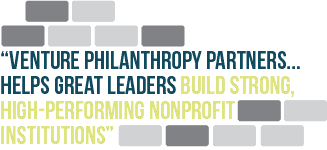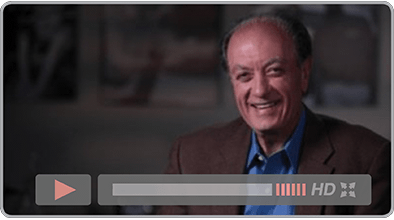
About Venture Philanthropy Partners
 Venture Philanthropy Partners... helps great leaders build strong, high-performance nonprofit institutions.
Venture Philanthropy Partners... helps great leaders build strong, high-performance nonprofit institutions. 
Venture Philanthropy Partners (VPP) is a philanthropic investment organization that helps great leaders build strong, high-performing nonprofit institutions. By investing strategically—not just granting generously—VPP aims to help community-based organizations increase their impact on the lives of the children they serve. It concentrates money, expertise, and personal contacts to improve the lives and boost the opportunities of children and youth of low-income families in the National Capital Region. VPP invests in high-potential nonprofit organizations that are serving the core developmental, learning, and educational needs of children from low-income families in the National Capital Region.
VPP focuses on philanthropic investment opportunities that have the greatest potential to improve the lives of children and that can help demonstrate its strategic, engaged, and highly leveraged approach. In 2010, VPP received a multimillion-dollar commitment from the federal government’s Social Innovation Fund to establish youthCONNECT. This collaborative partnership brought together six of the highest performing nonprofit service providers to improve education, employment, and healthy behavior outcomes for low-income and at-risk youth, ages 14-24, in the National Capital Region.

Mario Morino speaks about Venture Philanthropy Partners


 “Managing to outcomes is not about simply counting things or gathering information. And it is not about satisfying funders. It is an internal effort aimed at figuring out what works and what doesn’t, so that the organization can provide the best possible services to its clients”
“Managing to outcomes is not about simply counting things or gathering information. And it is not about satisfying funders. It is an internal effort aimed at figuring out what works and what doesn’t, so that the organization can provide the best possible services to its clients” “You have to have undying passion for the population you’re serving. We can spend time patting ourselves on the back for the 85 percent of the kids who are doing really well in our program. But we need to be as concerned about the 15 percent who aren’t succeeding and learn how we can improve for them.”
“You have to have undying passion for the population you’re serving. We can spend time patting ourselves on the back for the 85 percent of the kids who are doing really well in our program. But we need to be as concerned about the 15 percent who aren’t succeeding and learn how we can improve for them.” “Through a process of self-reflection, our board members asked themselves fundamental questions: How can we improve? How can we make a greater impact?”
“Through a process of self-reflection, our board members asked themselves fundamental questions: How can we improve? How can we make a greater impact?” “Every day, you have to say, ’How can we do this more efficiently and more effectively?’ It’s in our DNA.”
“Every day, you have to say, ’How can we do this more efficiently and more effectively?’ It’s in our DNA.” “Any school in the country can do this. And it breaks my heart that we’re not [all] doing this!”
“Any school in the country can do this. And it breaks my heart that we’re not [all] doing this!” “Stories substituting for facts is like fingernails on a chalkboard for me!”
“Stories substituting for facts is like fingernails on a chalkboard for me!” “You’re taking someone else’s money to get into somebody else’s life to try to make a difference. You better be showing you can make a difference!”
“You’re taking someone else’s money to get into somebody else’s life to try to make a difference. You better be showing you can make a difference!”